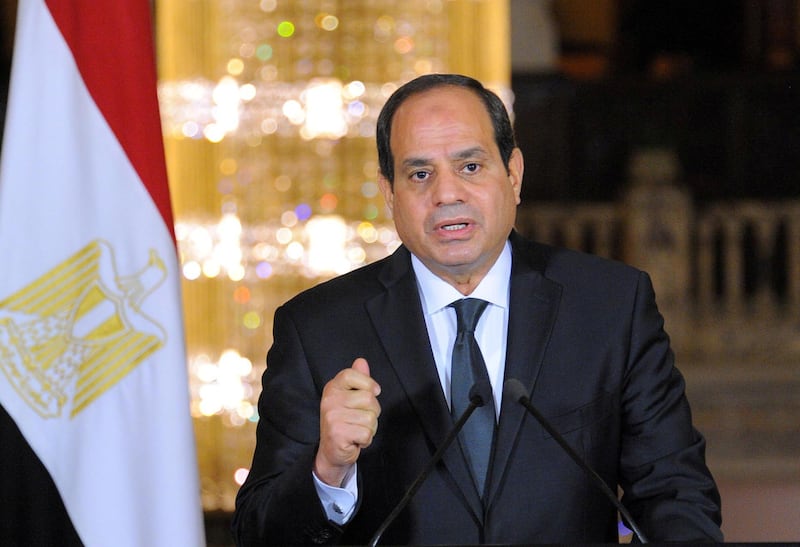Egypt's president flew to the West African nation of Guinea on Sunday en route to the United States, where he is scheduled to meet US President Donald Trump.
President Abdel Fattah El Sisi will spend one day in Guinea before he leaves for Washington on Monday and White House talks on Tuesday. The Egyptian leader leaves the United States the next day to return to West Africa, where he is scheduled to visit Cote d'Ivoire and Senegal before returning home on Friday.
Mr Sisi's talks in the three West African nations will focus on bilateral relations and regional issues in view of the Egyptian leader's current, one-year chairmanship of the African Union, according to presidential spokesman Bassam Radi.
A determined drive to bring Egypt closer to sub-Saharan Africa has seen Mr Sisi travel more on the continent than any previous Egyptian leader. The strategy is partly aimed at finding new markets for Egyptian exports, services and know-how, as well as cementing alliances at a time when Cairo is in need of African allies.
Egypt is at odds with Ethiopia – a heavyweight on the continent with one of its fastest growing economies – over its vital and large share of Nile water, which Cairo fears might be reduced by a massive dam Addis Ababa is building over the Blue Nile near its border with Sudan.
The three states have been engaged in on-and-off negotiations to reduce the impact of the dam on Egypt's water share, but little headway has so far been made.
Mr Sisi's White House visit, his second in as many years, comes at a crucial time for both the Egyptian leader and the Middle East.
Egypt's parliament, packed with Sisi supporters, is in the final stages of adopting far reaching constitutional amendments that, if adopted in a referendum expected later this month or early May, could allow the president to stay in office until 2034, empower him to exercise more control over the judiciary, and give the military from which he hails a supreme political role.
The eventual ratification of the amendments by house vote and later a general referendum is not in doubt, but Mr Sisi could benefit by a public expression of support from Mr Trump in the face of a likely storm of criticism by international rights groups and EU powers that see the changes as a return to authoritarian rule.
Regionally, the visit comes when the Middle East is seething with anger over Mr Trump's decision last week to recognise Israel's annexation of Syria's Golan Heights, a move that added insult to the injury caused when the president last year moved the US embassy to Jerusalem, recognising the city holy to Muslims, Christians and Jews alike as the capital of Israel.
The Palestinians aspire to have east Jerusalem, captured by Israel in the 1967 Middle East war, as the capital of their future state.
Egypt and the United States are bound by close political and military ties dating back to the 1970s. At present, Egypt receives some $1.3 billion a year in US military aid, a reward in large part for Egypt's 1979 peace treaty with Israel, the first between an Arab state and Israel.
Relations, however, significantly cooled during the administration of Barack Obama over a host of issues, including Egypt's rights record. They have since recovered following the election of Mr Trump in 2016. The two leaders now view each other as reliable allies.
Announcing the visit, the White House said the two leaders would discuss "building on our robust military, economic and counter-terrorism cooperation," regional economic integration, and "Egypt's longstanding role as a lynchpin of regional stability."







